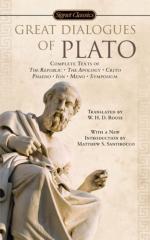
|
| Name: _________________________ | Period: ___________________ |
This test consists of 15 multiple choice questions and 5 short answer questions.
Multiple Choice Questions
1. Socrates firmly believes that poetry _____________.
(a) Is instrumental in helping the common man understand larger issues.
(b) Tends to prevent men from leading good lives.
(c) Is philosophy of the heart.
(d) Must be philosophy to be considered poetry.
2. Whom does Socrates think is the fourth (and least) happiest social class of man in the republic?
(a) The king.
(b) The aristocrat.
(c) The democratic man.
(d) The tyrant.
3. The Athenian jury finds Socrates_________.
(a) Guilty and sentences him to exile.
(b) Innocent and acquits him of all charges.
(c) Innocent on some charges but guilty on others.
(d) Guilty and sentences him to death.
4. To Socrates, government is best analogized as being similar to the human _________.
(a) Limbs.
(b) Heart.
(c) Brain.
(d) Soul.
5. Tyranny is most likely to occur under which form of government?
(a) Timocracy.
(b) Aristocracy.
(c) Oligarchy.
(d) Democracy.
6. Socrates metaphorically refers to himself as __________,
(a) A catalyst for a shift in power.
(b) The bosom of the cow.
(c) The gadfly of the state.
(d) A growing pain in the body.
7. According to Socrates, to what does a true philosopher owe his life?
(a) His God.
(b) His parents.
(c) The people.
(d) The state.
8. Which of the following ideas are not mentioned in Book VI?
(a) Learning is a process of recalling past knowledge.
(b) Hypotheses are helpful, but only when you cannot apprehend an idea without an example.
(c) The intellectual life of the philosopher is very rigorous.
(d) Philosophers can do good and evil.
9. According to Socrates' points in Book IV, the soul of a philosopher_____________________.
(a) Does not concern Socrates.
(b) Can be used for good and evil alike.
(c) Is better than the soul of a common man.
(d) Is easily persuadable.
10. How does Socrates regard a timocracy?
(a) Socrates thinks that timocracy is the worst form of government.
(b) Socrates thinks that timocracy is the best form of government in all cases.
(c) Socrates wonders about the possibility of military rule.
(d) Socrates claims that honor and passion of a military leader, while not unjust, are imperfect qualities that you don't want in a leader.
11. What is timocracy?
(a) Rule by the rich.
(b) Rule by the military.
(c) Rule by the elite.
(d) Rule by the poor.
12. In Book VII Socrates weaves an analogy suggesting that the common man is like________.
(a) A chicken in a coop, about to be slaughtered.
(b) A prisoner in a cave looking at shadow puppets and thinking it's real life.
(c) A starving beast, desperate for food.
(d) A willow flapping in the wind.
13. According to Socrates' opinion, what is the third happiest social class of man in the world?
(a) The tyrant.
(b) The democratic man.
(c) The philosophy student.
(d) The atheistic man.
14. According to Socrates, what did the Oracle at Delphi tell Socrates and Cherephon?
(a) The Oracle would not speak to Socrates and Cherephon.
(b) The Thirty Tyrants would bring times of war followed by prosperity.
(c) Socrates would be executed if he returned to Athens.
(d) Socrates was the wisest man alive.
15. Who is Cebes?
(a) Slave and master.
(b) Husband and wife.
(c) Son and father.
(d) Ally and enemy.
Short Answer Questions
1. What is Crito's relationship to Socrates?
2. What is an oligarchy?
3. According to Socrates' opinion, what is the second happiest social class of man in the world?
4. Socrates is primarily charged with________________.
5. What does Socrates think his dream means?
|
This section contains 639 words (approx. 3 pages at 300 words per page) |

|




